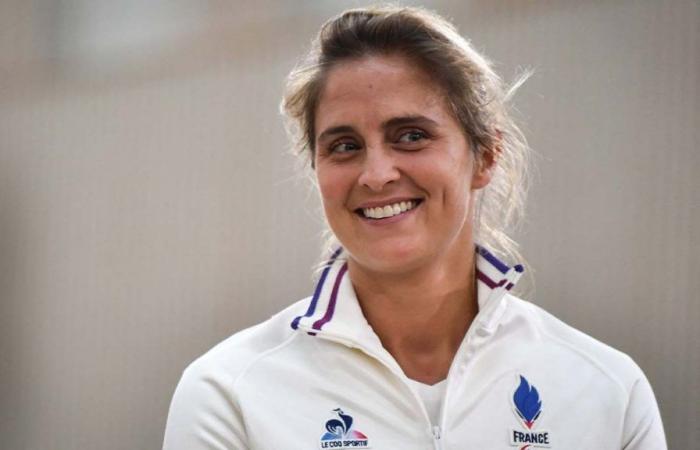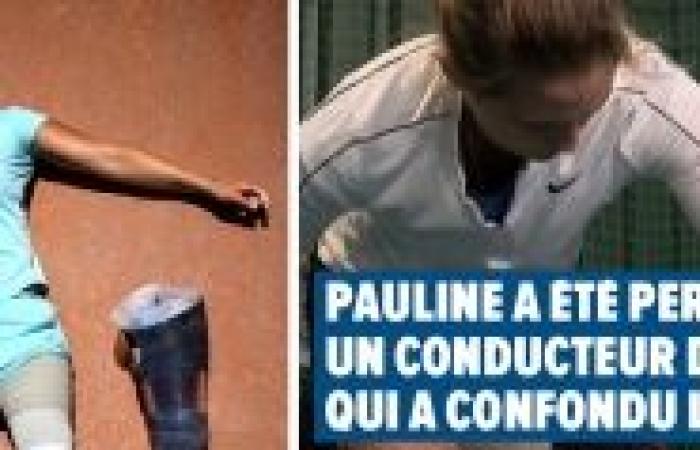Paralympic athlete, Pauline Déroulède shares her story marked by a tragic accident in 2019 in her book entitled “(Im)possible”. After losing her leg, she vowed to get back up and achieve the impossible by aiming for the Paralympic Games.
RTL info: Pauline Déroulède, you are a Paralympic athlete and participated in the Olympic Games in Paris. You arrived in this studio walking, was that important to you?
Pauline Déroulède: Indeed, it was important for me to be able to stand up again after the accident I had. I did everything to get back on my feet as quickly as possible, because I’m lucky enough to still be able to walk and it’s a source of pride every time.
You play wheelchair tennis. Is it complicated to sit in this chair while you walk?
At first it was difficult. I played standing up before the accident, and agreeing to play in a wheelchair was a real psychological blockage. I had prejudices, I accept it. I saw the chair only as a physical obstacle. Eventually, I had to learn to master it. And even though I walk in everyday life, I only use this chair for tennis now.
You have just published a book entitled “(Im)possible”. You tell your story there and this day of October 27, 2019. What happened that day?
It was an ordinary day, in a life in which I was very fulfilled. Et unfortunately I found myself mowed down on a sidewalk by a very elderly gentleman who lost control of his car, pressing the accelerator instead of the brake. That day there were 3 of us who got cut down. And upon shock, I immediately lost my left leg. I realize it right away. And there I fall into a world that I never imagined. We often think that this only happens to others, that day it happened to me. I also immediately understand that there will be a Pauline before and a Pauline after. And that we will have to fight to survive, and to live again in a second time.
You told your loved ones from your hospital bed: “I’m going to the Paralympic Games in Paris.” Where did this idea come from?
I understand at this point that we will need a very strong and ambitious objective. I make this promise to myself first. And also to reassure my loved ones who are very worried and who wonder what will become of me. And somewhere I immediately identified that it was sport and at the highest level that would allow me to survive and bounce back, but there was no guarantee of getting there but I needed to get hooked on this goal right away.
The title of your book “(Im)possible” marks this transition from drama to destiny?
That’s exactly what making the impossible possible is. Since this accident, I have been trying to transform this drama into something else. I had to do things that were impossible on paper and I made them possible, in any case that’s what I strive to do wherever I go now. I had to relearn how to walk with a prosthesis, a high-tech leg. And it’s true that I had to redo everything almost like a child. And the idea is to send the message that nothing is impossible, in any case that the impossible can become possible, it depends on us, on those around us, on the weapons we take, for me it was sport but for others it can be something else.
In your book you talk about re-education, the anger that accompanies it, and a military doctor who told you: “It’s clear you’re missing something, we’re not going back, it’s like that you don’t have a choice. You don’t even have a choice to think that you have a choice.” Was it a trigger for you?
This soldier who came into my room really shook me, literally, but he spoke to me very frankly. It was violent and brutal because I’m just a civilian who has just lost my leg, but it was useful to me later because he wanted to tell me that what was happening to me was just a detail and that indeed all the projects I had were just postponed. So it immediately gives a perspective towards the future, which I could not see alone and it is thanks to him that I was able to begin to imagine it and to project myself into this re-education that I have ultimately lived well thanks to soldiers around me, who were injured in external operations and who inspired me enormously. I understood very quickly that there were 10x worse than me and that I was going to be lucky enough to be able to walk again, so I had nothing to complain about.
You went through this ordeal with Typhaine, your companion. She declared her love to you shortly after the accident. How did you experience it?
At the time, I was overcome by despair. But those words, “I’m going to love you all my life,” were the most beautiful declaration of love anyone could receive. She was by my side throughout this ordeal. It’s incredibly lucky to have someone who loves us so much.
You became a mother in 2022. Is that the best part of the story?
It’s life that takes over. Our daughter, Ava, already knows the story of her two mothers. She is already open to the world and it is true that it is an absolute joy. And the beautiful thing is that even after tragedies, life takes over again and again, you just have to trust it.
You also fight for road safety. Has it become an integral part of your life?
Yes, there is the fight on the tennis court and then there is the fight outside, more societal, political. Because when I learned the circumstances of my accident, I told myself that this tragedy could have been avoided if just one person had stopped driving. The man who cut me down was unfit to drive, he was responsible. I am fighting so that in France and elsewhere, we can set up medical examinations for all drivers, with a more regular frequency from a certain age. And even if it is a difficult battle, we must find alternative mobility solutions. What will we do with people who can no longer drive? I have unwavering confidence that we will get there.
At the end of May, a 94-year-old motorist hit a stroller on a pedestrian crossing, endangering the baby’s life. In 2020, a 75-year-old lady drove the wrong way on the Charleroi ring. This ghost driver hit a vehicle before dying. Are our elders dangerous on public roads? Should we impose a compulsory test from a certain age, as is the case in the Netherlands and Spain? Who checks their fitness to drive? Find the Large Format “Senios at the wheel, permanent danger?”, on RTL play.
Pauline Déroulède Paralympic Games 2024 tennis Sport








